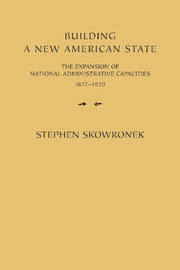Book contents
- Frontmatter
- Contents
- Preface
- Part I The state-building problem in American political development
- Part II State building as patchwork, 1877–1900
- Part III State building as reconstitution, 1900–1920
- Introduction: From patchwork to reconstitution
- 6 Reconstituting civil administration: economy, efficiency, and the repoliticization of American bureaucracy
- 7 Reconstituting the army: professionalism, nationalism, and the illusion of corporatism
- 8 Reconstituting business regulation: administrative justice, scientific management, and the triumph of the independent commission
- Epilogue: Beyond the state of courts and parties – American government in the twentieth century
- Notes
- Selected bibliography
- Index
Introduction: From patchwork to reconstitution
Published online by Cambridge University Press: 03 May 2010
- Frontmatter
- Contents
- Preface
- Part I The state-building problem in American political development
- Part II State building as patchwork, 1877–1900
- Part III State building as reconstitution, 1900–1920
- Introduction: From patchwork to reconstitution
- 6 Reconstituting civil administration: economy, efficiency, and the repoliticization of American bureaucracy
- 7 Reconstituting the army: professionalism, nationalism, and the illusion of corporatism
- 8 Reconstituting business regulation: administrative justice, scientific management, and the triumph of the independent commission
- Epilogue: Beyond the state of courts and parties – American government in the twentieth century
- Notes
- Selected bibliography
- Index
Summary
The rise of administrative power and the disintegration of governmental order
At the dawn of the twentieth century, opposition to party bosses and imperious judges was being voiced by a number of reform movements that otherwise had little in common. Populists, socialists, and corporate liberals railed against the way capitalism and democracy had developed under the aegis of courts and party machines and called for placing relations between the American economy and the American polity on a new foundation. With the legitimacy of the early American state under attack from all sides, government officials finally made the pivotal turn down the bureaucratic road. After 1900, the doors of power opened to those who saw a national administrative apparatus as the centerpiece of a new governmental order. The central question in institutional development was correspondingly altered. It was no longer a question of whether or not America was going to build a state that could support administrative power but of who was going to control administrative power in the new state that was to be built.
Considered against the alternatives, the special appeal of the bureaucratic remedy is not difficult to discern. It alone offered both a measure of moderation and a measure of continuity. Government officials had, after all, given their ears, if not their votes, to the bureaucratic reform agenda for over twenty years. The proponents of administrative expansion spoke to all who were fearful of socialists and agrarian radicals but were, at the same time, uncomfortable with making stark choices between support for industrial capitalism and support for democracy.
Information
- Type
- Chapter
- Information
- Building a New American StateThe Expansion of National Administrative Capacities, 1877–1920, pp. 165 - 176Publisher: Cambridge University PressPrint publication year: 1982
Accessibility standard: Unknown
- 2
- Cited by
